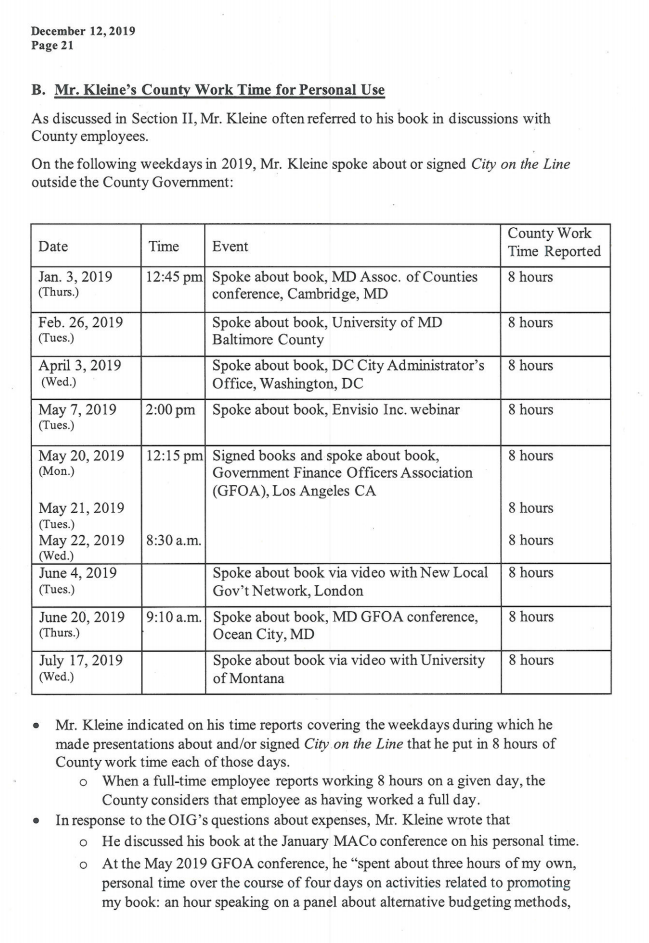By Adam Pagnucco.
Yesterday, we listed posts 11 through 20 in terms of page views for the year 2020. Here are the top ten.
In the wake of former Chief Administrative Officer (CAO) Andrew Kleine’s admitted ethics violations, County Executive Marc Elrich wanted him to stay in his job. But the county council was outraged by the scandal and exploded in public fury. The council’s anger wound up forcing Kleine out and opened the door to the ascension of the new CAO, former county budget director and state senator Rich Madaleno.
The problems with the 2020 primary election prompted this historical post summarizing why the state has a law protecting its elections administrator, Linda Lamone, from accountability. Comptroller Peter Franchot and Lieutenant Governor Boyd Rutherford called for Lamone’s resignation but she survived for the thousandth time. Thankfully, the general election was a smoother affair than the primary.
- Sitting Judges Get Temporary Restraining Order Against Pierre
- Progressive-Backed Judge Candidate Courted, Donated to Republicans
- Judge Candidate on Floyd Cops: “Lock Em Up”
It’s fitting that these three posts finished back-to-back-to-back because they all concern the nastiest judicial election in recent MoCo history: the challenge by attorney Marylin Pierre to four sitting judges. This one had a LOT going on: partisanship, charges of racism, charges of lying and even a temporary restraining order. The whole thing cast a foul odor over the ballot box and led me to conclude that judicial elections should mostly be abolished.
School board elections are mostly sleepy affairs in which candidates agree at least 90% of the time and the only difference between them is which ones are endorsed by the Apple Ballot and the Post. Not this year! MCPS’s boundary study dominated the primary and school reopening took the spotlight in the general, with Lynne Harris (the Post’s candidate) blasting the teachers union for allegedly resisting reopening. Harris told Blair High School’s Silver Chips newspaper that the teachers “were obstructionist, inflammatory, and just said ‘no’ to everything.” That provoked a furious response and the teachers are unlikely to forget it.
Early in the COVID crisis, Governor Larry Hogan gave counties discretion to allow restaurants to offer takeout and delivery of mixed drinks. Many other states and the City of Baltimore allowed it, but MoCo’s liquor monopoly did not. The issue prompted a mass revolt by restaurants and consumers and the county ultimately allowed it.
County Inspector General Megan Davey Limarzi blew the lid off county government with her landmark report on an overtime scam in the fire department. The scandal involved more than $900,000 of overtime which exceeded limits set by the fire chief and was scheduled outside of the system usually used by county public safety agencies. Readers were all over this but I have not heard of anyone being disciplined for it. As of this writing, this is the sixth most-read post in the history of Seventh State measured by page views.
Last July, The Grille at Flower Hill in Gaithersburg posted this on Facebook: “Let me be very clear…my staff will not wear face masks while working here at the Grille. If that bothers you then please dine elsewhere and please try to find something more important to occupy your time such as volunteer at a nursing home or soup kitchen. Whoever you are that filed the complaint, you need to take a good look in the mirror and try to find some real meaning in your life.” The post provoked a huge firestorm from irate customers resulting in the permanent closure of the restaurant four days later. As of this writing, this is the fifth most-read post in the history of Seventh State measured by page views.
This post reprinted the Montgomery County Democratic Party’s statement on the four ballot questions. It was originally published on September 17 and initially attracted little site traffic. But it started to pop in early and mid-October and dominated page views in the latter part of the month. Most of the traffic was generated by Google searches. This provided valuable intel: thousands of people were seeking out what the Democratic Party had to say about a group of arcane and confusing ballot questions. And if they were coming to Seventh State, they were no doubt also visiting other sites with similar information like news outlets and the party’s own site. In the end, it seems likely that the party was the dominant force in driving voter reaction to the ballot questions as its positions carried the election by double digits. It was also a huge boon to us as this post ranks third in page views in the history of Seventh State.
On to 2021!








